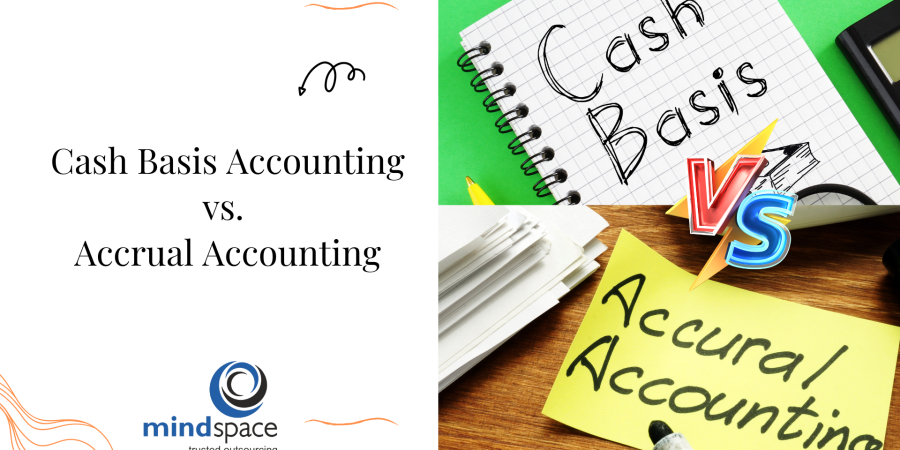Cash Basis Accounting vs. Accrual Accounting
In the realm of accounting, two primary methods govern how businesses record their financial transactions: cash basis accounting and accrual accounting. While both approaches aim to provide an accurate representation of a company’s financial health, they differ significantly in their timing of revenue and expense recognition. In this comprehensive guide, we’ll delve into the intricacies of cash basis accounting and accrual accounting, explore their respective advantages and limitations, and help you determine which method is best suited for your business needs.
Cash Basis Accounting: Tracking Transactions in Real-Time
Cash basis accounting is a straightforward method that records transactions based on actual cash inflows and outflows. Under this approach, revenue is recognized when cash is received, and expenses are recorded when cash is paid out. Cash basis accounting is commonly used by small businesses and individuals due to its simplicity and ease of implementation. However, it may not provide a comprehensive picture of a company’s financial performance, as it does not account for transactions that have been invoiced but not yet paid or received.
Advantages of Cash Basis Accounting:
- Simplicity: Cash basis accounting is easy to understand and implement, making it suitable for small businesses with limited accounting resources.
- Real-Time Tracking: Transactions are recorded as they occur, providing immediate insights into cash flow and liquidity.
- Tax Advantages: Cash basis accounting can offer tax benefits by allowing businesses to defer taxes on income until it is received and deduct expenses when they are paid.
Limitations of Cash Basis Accounting:
- Limited Accuracy: Cash basis accounting may not accurately reflect a company’s financial position, as it does not account for transactions that have been invoiced but not yet paid or received.
- Timing Mismatch: Revenue and expenses may not be recognized in the period in which they are earned or incurred, leading to distortion in financial statements.
- Complexity in Reporting: Cash basis accounting may not comply with generally accepted accounting principles (GAAP) or be suitable for reporting to external stakeholders, such as investors or creditors.
Accrual Accounting: Matching Revenue and Expenses to the Period They Occur
Accrual accounting, on the other hand, follows the matching principle, which dictates that revenue and expenses should be recognized in the period in which they are earned or incurred, regardless of when cash is received or paid. Under this method, revenue is recorded when it is earned, and expenses are recognized when they are incurred, even if payment has not yet been made. Accrual accounting provides a more accurate representation of a company’s financial performance and is widely used by large corporations and entities that require compliance with GAAP.
Advantages of Accrual Accounting:
- Accurate Financial Reporting: Accrual accounting provides a more accurate depiction of a company’s financial position by matching revenue and expenses to the period in which they occur.
- Better Decision-Making: Accrual accounting offers insights into long-term financial trends and enables more informed decision-making by providing a holistic view of financial performance.
- GAAP Compliance: Accrual accounting aligns with GAAP standards, making it suitable for reporting to external stakeholders and ensuring transparency and consistency in financial statements.
Limitations of Accrual Accounting:
- Complexity: Accrual accounting can be more complex and time-consuming to implement than cash basis accounting, requiring careful tracking of transactions and adjustments for accruals and deferrals.
- Cash Flow Discrepancies: While accrual accounting provides a more accurate picture of financial performance, it may not always align with actual cash flow, leading to discrepancies between reported earnings and available cash.
- Potential for Manipulation: Accrual accounting allows for more discretion in recognizing revenue and expenses, which may open the door to manipulation or earnings management practices.
Choosing the Right Method for Your Business
When deciding between cash basis accounting and accrual accounting, consider the following factors:
- Business Size and Complexity: Cash basis accounting may be suitable for small businesses with straightforward transactions and limited reporting requirements, while accrual accounting is better suited for larger companies with complex financial operations and external reporting obligations.
- Financial Reporting Needs: If your business requires compliance with GAAP or reporting to external stakeholders, such as investors or creditors, accrual accounting is essential to provide accurate and transparent financial statements.
- Cash Flow Management: Cash basis accounting offers a more straightforward approach to cash flow management, making it easier to track available funds and manage day-to-day expenses. However, accrual accounting provides a more comprehensive view of financial performance and trends, enabling better long-term planning and decision-making.
- Tax Considerations: While cash basis accounting may offer tax advantages in certain situations, such as deferring taxes on income until it is received, accrual accounting may be required for tax purposes in some jurisdictions or industries.
Ultimately, the choice between cash basis accounting and accrual accounting depends on your business’s specific needs, goals, and regulatory requirements. Consider consulting with a qualified accounting professional to assess your options and determine the most appropriate accounting method for your business.
Conclusion: Navigating the Accounting Landscape
Cash basis accounting and accrual accounting represent two distinct approaches to recording financial transactions, each with its own set of advantages and limitations. While cash basis accounting offers simplicity and real-time tracking of cash flow, accrual accounting provides a more accurate and comprehensive view of financial performance. By understanding the differences between these two methods and considering your business’s size, complexity, and reporting needs, you can make an informed decision about which accounting method is best suited for your organization. Whether you opt for cash basis accounting or accrual accounting, ensuring accurate and transparent financial reporting is essential for driving long-term success and growth in today’s competitive business landscape.


